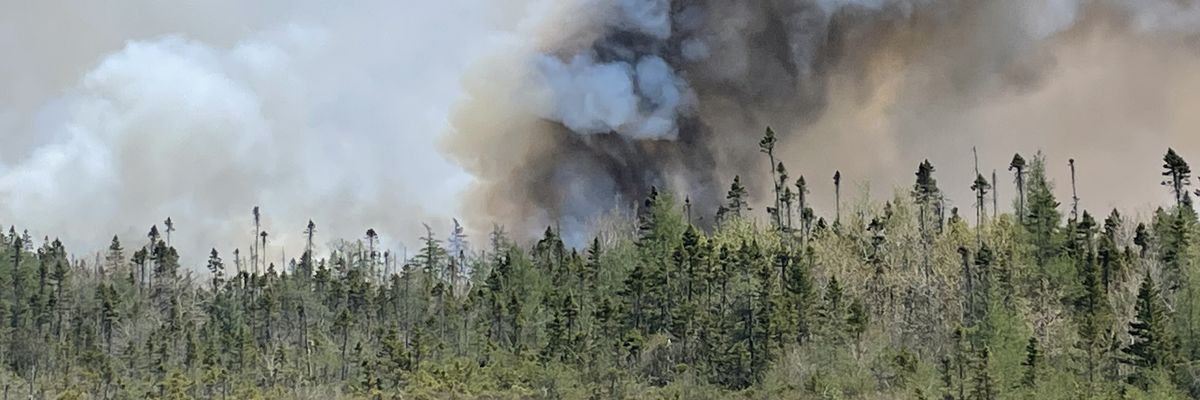Officials and climate experts in Nova Scotia, Canada on Tuesday pointed to numerous climate-related factors that have contributed to the wildfires that are raging in the province this week, forcing the evacuation of more than 16,000 people and destroying roughly 200 homes and other structures.
The Tantallon fire in the Halifax area and the Barrington Lake fire in the southwestern county of Shelburne have burned through a combined 25,000 acres in the Maritime province, which, as one firefighter told the Canadian newspaper SaltWire, has historically been far less likely to experience such blazes than landlocked western provinces.
"This the worst fire I've ever been on," volunteer firefighter Capt. Brett Tetanish told SaltWire. "I've been on other large fires in Nova Scotia, Porters Lake, we lost structures there, but you don't see fires like this in Nova Scotia. You see these in Alberta."
Tetanish described a "surreal" scene as he drove toward the Tantallon fire on Sunday evening.
"We're driving on Hammonds Plains Road with fire on both sides of the road, structures on fire, cars abandoned and burnt in the middle of the road," he told SaltWire.
Other witnesses, including a filmmaker, posted videos on social media of "apocalyptic scenes" showing fires destroying homes and huge plumes of smoke rendering highways nearly invisible to drivers.
"I almost died," said the filmmaker. "The fire is spreading, it's very serious. We couldn't see anything."
Halfway through 2023, Nova Scotia has already experienced more wildfires than it did in all of 2022, according to the National Observer.
Karen McKendry, a wilderness outreach coordinator at the Ecology Action Center in Nova Scotia's capital, Halifax, told the Observer the province has experienced hotter dryer weather than normal this spring, making it easier for fires to spread.
"People haven't always, on a national scale, been thinking about Nova Scotia and wildfires," McKendry said. "What dominates the consciousness, rightly so in Canada, is what's happening out West. But with a warming climate and some drier seasons, this is going to become more common in Nova Scotia. So more fires, more widespread fires, more destructive fires from a human perspective as well."
The province's Department of Natural Resources and Renewables (DNRR) also warned last Friday that the wildfires were taking hold in the region less than a year after Hurricane Fiona downed what Premier Tim Houston called a "significant" number of trees across Nova Scotia.
"Fires in areas where Hurricane Fiona downed trees have the potential to move faster and burn more intensely, making them potentially more difficult to contain and control," said the DNRR. "At this time, needles, twigs, leaves, etc., support fire ignition and spread. With high winds, the spread can be rapid and intense."
Scientists last year linked warming oceans, fueled by the continued extraction of fossil fuels and emissions of planet-heating greenhouse gases, to Fiona's destruction in Eastern Canada.
Canadian Prime Minister Justin Trudeau warned Monday that the situation in Nova Scotia is "incredibly serious," prompting Saman Tabasinejad, acting executive director of Progress Toronto, to point to Trudeau's support for fossil fuel projects like the Trans Mountain Pipeline.
"This would be a great time to end fossil fuel subsidies and invest in a Green New Deal!" Tabasinejad said on Twitter.
More than 200 crews have been sent by government agencies from across the province, and Nova Scotia officials said Tuesday that both the Tantallon and Barrington Lake fires were still "out of control" two days after they began and were "rapidly moving."
Halifax Fire and the DNRR are investigating the cause of the fires.
McKendry pointed out that a number of anti-conservation activities may be linked to increased wildfires.
Roads being built "deep into our forests" have allowed more people opportunities to accidentally set fires, while the government has been "emptying our urban areas of wetlands," making it easier for blazes to spread widely.
"Do not delude yourself into thinking this is a one-off," journalist John Vaillant toldSaltWire on Monday. "The world is more flammable than it has ever been."
